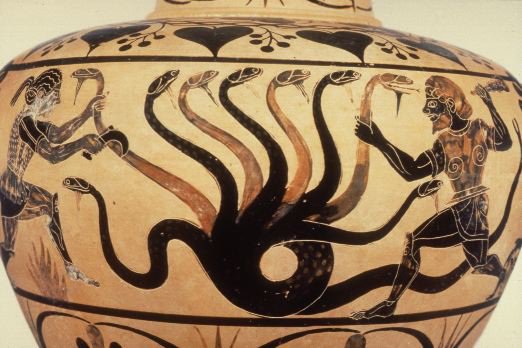
HOME || LAST LABOUR || NEXT LABOUR
The second labour of Hercules was to kill the Lernean Hydra. From the murky waters of the swamps near a place called Lerna, the hydra would rise up and terrorize the countryside. A monstrous serpent with nine heads, the hydra attacked with poisonous venom. This beast would not be easy to kill, for one of the nine heads was immortal and therefore indestructible.
Hercules set off to hunt the nine-headed menace, but he did not go alone. His trusty nephew, Iolaus, was by his side. Iolaus, who shared many adventures with Hercules, accompanied him on many of the twelve labours. Legend has it that Iolaus won a victory in chariot racing at the Olympics and he is often shown as Hercules' charioteer. So, the pair drove to Lerna and by the springs of Amymone, they discovered the lair of the loathsome hydra.

First, Hercules lured the coily creature from the safety of its den by shooting flaming arrows at it. Once the hydra emerged, Hercules seized it. The monster was not so easily overcome, though, for it wound one of its coils around Hercules' foot and made it impossible for the hero to escape. With his club, Hercules attacked the many heads of the hydra, but as soon as he smashed one head, two more would burst forth in its place! To make matters worse, the hydra had a friend of its own: a huge crab began biting the trapped foot of Hercules. Quickly disposing of this nuisance, most likely with a swift bash of his club, Hercules called on Iolaus to help him out of this tricky situation.
Each time Hercules bashed one of the hydra's heads, Iolaus held a flaming torch to the headless tendons of the neck. The flames prevented the growth of replacement heads, and finally, Hercules had the better of the beast. Once he had removed and destroyed the eight mortal heads, Hercules chopped off the ninth, immortal head. This he buried at the side of the road leading from Lerna to Elaeus, and for good measure, he covered it with a heavy rock. As for the rest of the hydra, Hercules slit open the corpse and dipped his arrows in the venomous blood.
Eurystheus was not impressed with Hercules' feat, however. He said that since Iolaus had helped his uncle, this labour should not count as one of the ten. This technicality didn't seem to matter much to anyone else: the ancient authors still give Hercules all of the credit. Even so, Pausanias did not think that this labour was as fantastic as the myths made it out to be: to him, the fearsome hydra was just, well, a big water snake!